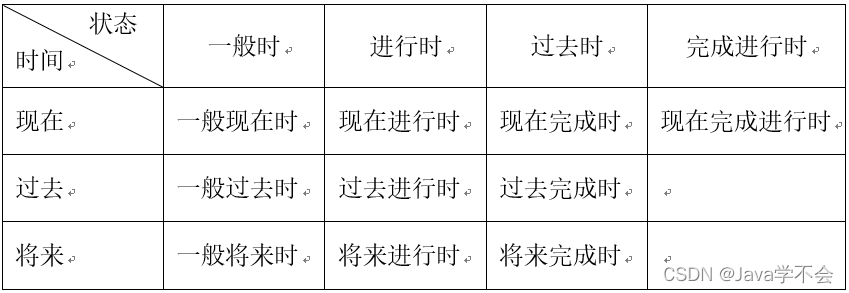- 含义:
- 时:动作发生的
时间 - 态:动作存在的状态
(动词的形式)
- 类型:

1、一般时
1.1、一般现在时
- 一般现在时:
- 结构:
- do/does
- am/is/are
1.1.1、补充
- 一般现在时可用于表达
客观事实和普遍真理
eg.太阳从东边升起
The sun rises (rise) in East. - 一般现在时可用于表示人物的
特征,性格,能力。
1.2、一般过去时
- 结构
- did
- was/were
1.2.1、补充
used to do(过去常常做)- be used to do ··· (被用来做某事)
be used to doing(习惯于)
- 练习
- Her son ___ coke, but now he ___ milk.
A. used to drink;used to drinking
B. used to drinking;dinks
C. is used to drinking;used to drink
D. is used to drink;is drinking
1.3、一般将来时
- 结构
- will do(所有人称)
- shall do (第一人称)
1.3.1、补充
一般将来时的其它表达方式:
- be going to = will 将要做某事
eg.我们明年去贵州旅游。
We will travel to Guizhou next year.
We are going to travel to Guizhou next year. - be about to do ··· when ··· 正要做某事时,就在这时
eg.他们正要进行下一步的时候,就在这时男生突然放了个屁。
They are zbout to continue with the next step when the boy suddenly farts. - be to do 是要做某事
eg.我今生的唯一目标就是将你逮捕。
The only goal of life is to arrest you.
2、进行时
2.1、现在进行时
- 此时此刻动作正在进行
- 结构: am/is/are doing
- eg.听!海哭的声音。
Listen!the sea is crying (cry).
2.2、过去进行时
- 过去某时刻动作正在发生
- 结构: was/were doing
- 时间状语:具体时间+一般过去时时间状语
- eg.我昨天晚上九点在看书。
I was reading read at nine last night.
2.2.1、考点
- 过去进行时与一般过去时互为时间背景
- **结构:**主语1 was/were doing when 主语2 did (主语1正在做···这时主语2···)
- 一个动作正在发生,另一个动作突然发生
- eg.白雪公主正在睡觉的时候七个小矮人进来了。
Snow White was sleeping (sleep)when the seven dwarfs came (come) in.
2.2、将来进行时
- 动作在将来某一时刻正在进行
- **结构:**will/shall be doing
- 时间状语:具体时间+一般将来时时间状语
- eg.明天这个时候我正在做作业
I will be doing (do) homework at this time tomorrow.
3、完成时
3.1、现在完成时
- 动作截止现在已经完成
- **结构:**have/has done
- 时间状语:
- 起始时间:since
- 持续时间:for+一段时间
- 截止时间:already,yet,recently,by now
- eg.在过去两年中他做了许多工作。
He has done (do) a lot of work in the past two years.
3.1.1、补充
- 去过某地: have/has been to (回来了)
- 去了某地: have/has gone to (没回来)
eg. 他在哪儿? Where is he?
他去北京了。 He has gone to Beijing.
3.1.2、练习
- She has ___ to the park, she will be back in two hours.
- They have ___ to the forest alone and returned safely.
- I have ___ to Hong Kong twice.
- Tom has ___ to the W.C,so I have to wait for him.
3.2、过去完成时
- 动作截止到过去已经完成
- 结构: had done
- 时间状语:
- 起始时间:
- Before+主语+did,主语+had done
- After+主语+had done,主语+did
eg.Before we arrived (arrive),the plance had taken (take) off.
After the plane had taken off,we arrived.
- 持续时间:for+一段时间(句中有表示过去时间的词)
- 截止时间:by+过去时间
3.2.1、注意
- 当句子中无时间状语,两个动作都发生在过去,考察
过去的过去这一概念时,先发生的动作用过去完成时,后发生的动作用一般过去时。
eg.他说他曾经很了解她。
He said (say) that he had known (know) her well.
3.3、练习
- Isn’t it lovely think that I ___ myself on the sunny beach at this time tomorrow?
A. will enjoy
B. am enjoying
C. will be enjoying
D. shall enjoy - Mary ___ a dress when she out her finger.
A. will stay
B. are staying
C. stay
D. stayed - I ___ my face when suddenly someone knocked at the door.
A. washed
B. am washing
C. was washing
D. will wash - — I phoned you at 7:00 yesterday eveing but nobody answered.
— Oh,I ___ my dog in the park then.
A. walked
B. was walking
C. had walked
D. would walk - There ___ not any more message from him since we graduated from college.
A. has been
B. had been
C. was
D. is - Helen ___ her keys in the office so she had to wait until her husband came home.
A. has left
B. left
C. had left
D. will have left - I wonder why lenny ___ us recently.We should have heard from her by now.
A. hasn’t written
B. doesn’t write
C. won’t write
D. hadn’t written - So far,it ___ this week.
A. is raining
B. rained
C. rains
D. has been raining - She ___ what had happened to her computer before she walked to the door.
A. had noticed
B. has noticed
C. noticed
D. would notice
3.4、将来完成时
- 结构: will/shall have done
- 时间状语:
- 持续时间: for+一段时间
(句中有表示将来时间的词) - 截止时间:by+将来时间
- 例子:下个月我就会减肥成功了。
By the next month,I will have lost (lose) weight successfully.
4、现在完成进行时
- 动作截止到现在未完成,还在继续
- 动作从过去发生持续到现在,完成了一部分,还将持续下去或者表示对某动作的强调。译为
一直在做
- 结构: have/has been doing
- 时间状语:同现在完成时
- 例子:
- 我们已经工作两个小时了。让我们休息一下吧!
We have been working (work) for two hours,,Let’s havea rest. - Alice is sunburned,for she has been lying on the beach all afternoon.
4、补充
- By the time 主语+
do/does,主语+will/shall have done - By the time 主语+
did,主语+had done - It
is+the+序数词+time+that+主语+have/has done - It
was+the+序数词+time+that+主语+had done
5、动词的语态
- 通式:
be done - 含义:把宾语变为主语,把动词的形式变为
be done - 例子:
- 他的妈妈叫他起床了。
His mother told him to get up
他被他的妈妈叫起床了
He was told to get up by his mother
5.1、各种时态下的被动语态
- 一般时的被动
| 一般现在时的被动 | am/is/are done |
|---|
| 一般过去时的被动 | was/were done | | 一般将来时的被动 | will/shall be done |
- 进行时的被动
| 现在进行时的被动 | am/is/are being done |
|---|
| 过去进行时的被动 | was/were being done |
- 完成时的被动
| 现在完成时的被动 | have/has been done |
|---|
| 过去完成时的被动 | had been done | | 将来完成时的被动 | will/shall have been done |
5.2、注意
- 不及物动词无被动:
- 感官动词主动形式表被动含义
look,sound,smell,taste,feel
eg.The food tastes (taste) good. - 发生(happen/occur/take place)无被动
- 某些动词与副词的搭配,主动形式表被动含义
V:sell,wirte,wash,clean
Adv:well,quickly,easily,smoothly
eg.他是一个有名的歌手,他的演唱会门票卖的非常好。
He is a famous singer and his concert tickets sell sell well.
|
